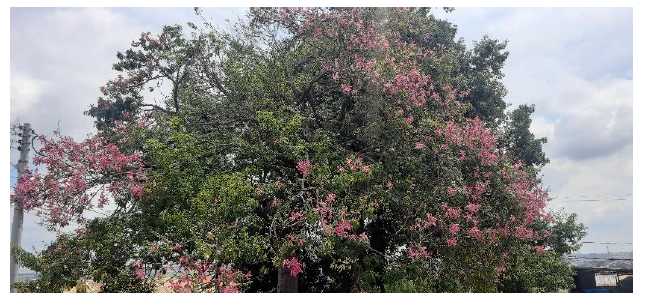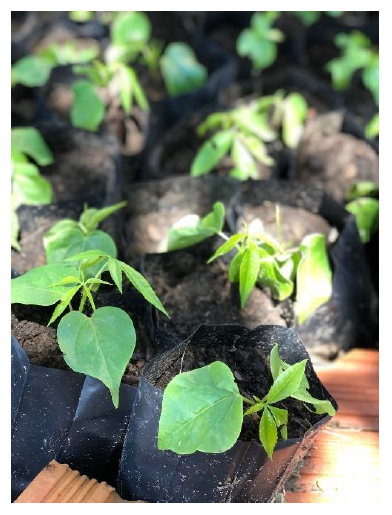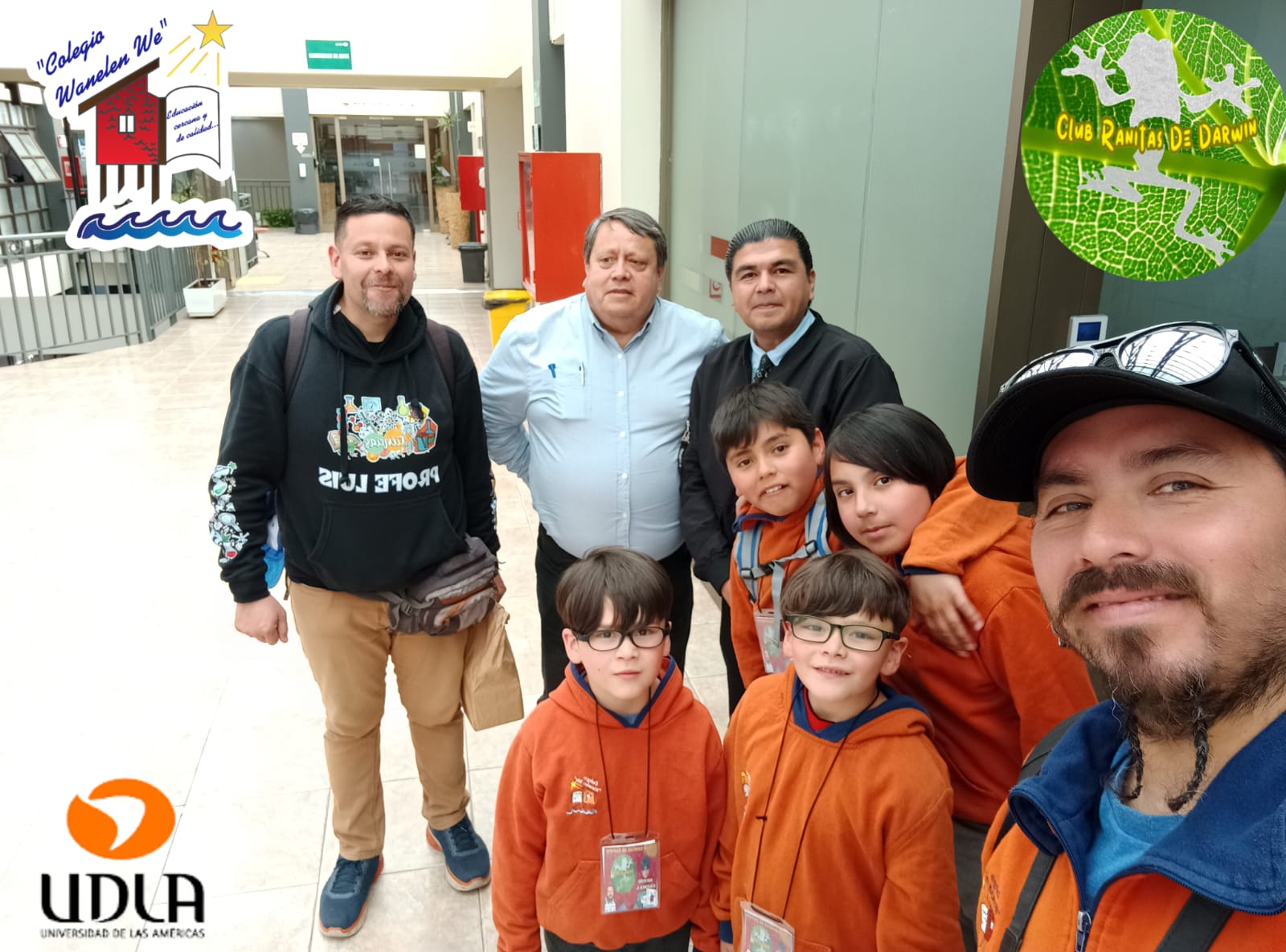Stars and STEM Stories
GLOBE Brazil and Chile: Students Engage in Research on Climate, Trees, and Water Scarcity
In recent months, Orlando Signorelli State School in southeastern Brazil embarked on an environmental awareness project in collaboration with the GLOBE Program to understand the role of local trees in regulating climate. Under the guidance of GLOBE Educator Acácio Silva and with support from GLOBE Mentor Trainer Inês Mauad, the students were trained to use the GLOBE Observer app and platform to collect data on trees in their community. This project aimed to transform the school environment into a living laboratory for citizen science, promoting both environmental responsibility and deeper awareness.
 Students
designed the project to investigate how the pink silk floss trees
(Ceiba speciosa) found in the school’s green area affect the climate.
The students were tasked with exploring whether these large trees had
any measurable influence on the local microclimate, particularly
during hot summer days. Their challenge was then to take what they
learn locally and apply scientific knowledge and GLOBE Program tools
to understand how these trees contributed to climate regulation
globally.
Students
designed the project to investigate how the pink silk floss trees
(Ceiba speciosa) found in the school’s green area affect the climate.
The students were tasked with exploring whether these large trees had
any measurable influence on the local microclimate, particularly
during hot summer days. Their challenge was then to take what they
learn locally and apply scientific knowledge and GLOBE Program tools
to understand how these trees contributed to climate regulation
globally.
Driven by their curiosity, the students initiated an investigative project focused on evapotranspiration—studying the moisture generated by the respiration and transpiration processes of large trees. They conducted detailed observations and collected data to analyze whether a single tree could affect the surrounding air temperature and humidity. Through this hands-on research, they learned how these trees acted as natural climate regulators, especially during hot, dry periods.
 The
students’ research yielded surprising results, showing that even a
single tree can significantly influence local air temperature and
humidity. Their findings highlighted the importance of trees in
maintaining environmental balance. The project didn’t stop with data
collection, however. Students also planted new trees and created a
book of poetry on environmental preservation. These efforts extended
beyond the classroom, sparking conversations and inspiring change
within the local community. The ongoing monitoring of the newly
planted trees instilled a lasting sense of environmental stewardship
in the students, contributing to a stronger community commitment to
sustainability and climate action.
The
students’ research yielded surprising results, showing that even a
single tree can significantly influence local air temperature and
humidity. Their findings highlighted the importance of trees in
maintaining environmental balance. The project didn’t stop with data
collection, however. Students also planted new trees and created a
book of poetry on environmental preservation. These efforts extended
beyond the classroom, sparking conversations and inspiring change
within the local community. The ongoing monitoring of the newly
planted trees instilled a lasting sense of environmental stewardship
in the students, contributing to a stronger community commitment to
sustainability and climate action.
The project not only generated scientific knowledge but also fostered a strong sense of environmental responsibility among students. Through hands-on research and the use of GLOBE Program tools, students discovered the real impact trees can have on the local climate, sparking a lasting commitment to environmental preservation. This initiative extended beyond the school, influencing the community and strengthening the link between science and citizen action. The project's success showed that small local actions can lead to significant changes, inspiring others to pursue a more sustainable future.
Chile
In Chile, two primary schools are participating in GLOBE research. The Dominican Mothers school in Pitrufquén is a hub for science education in the region thanks to the leadership of Teacher GLOBE Teacher Pablo Godoy, who joined GLOBE in 2020. The school has an automated weather station, a laboratory equipped with tools needed for GLOBE protocols, and a particulate matter monitoring station, among other instruments. Additionally, the surrounding area—rich in bodies of water and forests—provides opportunities for field measurements for students, who conduct activities related to atmosphere and water in their workshops.
 As
part of a water scarcity campaign, students conducted a study on
rainwater filtration similar to an initiative developed by the
Vilos
High School. They participated in GLOBE LAC Tree Campaigns I and
II and are currently engaged in monitoring a lentic water body as well
as collaborating on a rainwater campaign with the Huechulafquen
scientific group, led by Professor Ana Prieto from the partner
community of Junín de los Andes in Argentina.
As
part of a water scarcity campaign, students conducted a study on
rainwater filtration similar to an initiative developed by the
Vilos
High School. They participated in GLOBE LAC Tree Campaigns I and
II and are currently engaged in monitoring a lentic water body as well
as collaborating on a rainwater campaign with the Huechulafquen
scientific group, led by Professor Ana Prieto from the partner
community of Junín de los Andes in Argentina.
The second school, Wenalen We in Chiloé, joined GLOBE Chile in 2022. Under the coordination of GLOBE Educator Luis Cáceres, students at the school have been conducting scientific fieldwork. The school’s Ranitas de Darwin science group—“Darwin’s Little Frogs”—won first prize in basic education student research at the Chilean Science Club Congress, earning the opportunity to present their work in Lima, Peru, in November 2024. Their research is also based on the GLOBE LAC Tree Campaign. Additionally, during a trip to Santiago with his students, Professor Cáceres was invited to speak about his experience as a former student of pedagogy at the University of the Americas and was recognized for his outstanding work in advancing the scientific education of young students.
 When
asked about their experiences working on scientific projects, the
students expressed satisfaction with their achievements, which have
allowed them to stand out in their communities and explore new
opportunities beyond their local areas. One student in particular, a
member of Darwin’s Little Frogs who had never left Chiloé, was excited
and amazed to visit iconic sites in the capital for the first time.
When
asked about their experiences working on scientific projects, the
students expressed satisfaction with their achievements, which have
allowed them to stand out in their communities and explore new
opportunities beyond their local areas. One student in particular, a
member of Darwin’s Little Frogs who had never left Chiloé, was excited
and amazed to visit iconic sites in the capital for the first time.
Raúl Pérez Orellana, GLOBE Chile’s Country Coordinator, said, “It is
a privilege to have teachers as motivated and dedicated as Pablo and
Luis in our program. Their commitment elevates the profession and
makes those of us who have devoted much of our lives to training
science teachers, both in schools and in academia, proud. It is
incredibly moving to see the excitement and joy in the children’s
faces as they participate in these activities. These experiences will
become meaningful parts of their lives.”





